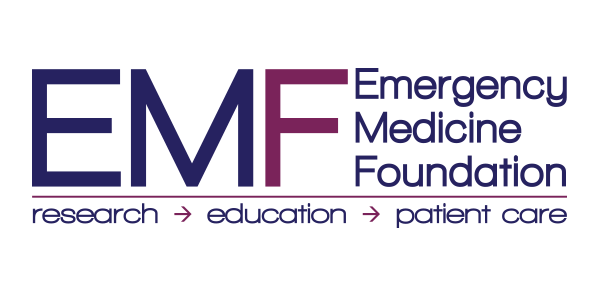
Founded in 1972 by ACEP, the mission of the Emergency Medicine Foundation (EMF) is to fund science that advances the careers of emergency medicine researchers, provides the basis for effective health policy, and ultimately improves patient care. Every year, EMF awards grants to investigators conducting emergency medicine research at various stages of their career, from medical students to midcareer physicians.
Explore This Issue
ACEP Now: Vol 40 – No 09 – September 2021 For its 2020–2021 grant cycle, EMF awarded nearly $1 million in grants. One of its recipients was Janice Blanchard, MD, PhD, who received $38,777 for her project titled “An Evaluation of Stressors Related to COVID-19 in Emergency Medicine Physicians.” We recently spoke with Dr. Blanchard, professor of emergency medicine and chief of the health policy section at the George Washington School of Medicine & Health Sciences in Washington, DC, about her research and how she hopes it’ll change the field.
For its 2020–2021 grant cycle, EMF awarded nearly $1 million in grants. One of its recipients was Janice Blanchard, MD, PhD, who received $38,777 for her project titled “An Evaluation of Stressors Related to COVID-19 in Emergency Medicine Physicians.” We recently spoke with Dr. Blanchard, professor of emergency medicine and chief of the health policy section at the George Washington School of Medicine & Health Sciences in Washington, DC, about her research and how she hopes it’ll change the field.
Why did you choose this topic?
In April and May of 2020, I felt a lot of stress in the workplace. I also saw the stress in my colleagues, and I really worried about our long-term mental health. It made me wonder what was going on across the country. Is this something that we’re all experiencing? I realized that we needed to better understand the stress to help generate solutions.
What are the goals of your research?
The purpose is to try to design interventions to address the stress in the future. Long term, we really want to understand what changes at the organizational level and individual level can alleviate workplace stress in the future. Even before the pandemic, emergency medicine clinicians and emergency medicine physicians in particular had really high levels of burnout. This isn’t going away, we’re still having those same issues that will increase our levels of burnout, and we may have more pandemics in the future. It’s really important to understand how to decrease that burnout and anxiety and how to do that by alleviating some of the stress that emergency medicine clinicians face.
The stress can be multifold. It can be due to organizational factors, it can be due to lack of peer support, and we really need to understand how to address each of those issues better. When there are higher levels of anxiety, depression, and particularly burnout, clinician work productivity decreases. When your clinicians aren’t happy and aren’t effective, that translates to poor patient care.
Could you share some details about your project?
We have 10 sites, including Los Angeles, Dallas, New Orleans, New York City, and Washington, D.C., which makes our study unique. We have included emergency medicine physicians, emergency medicine nurses, and EMS workers. We are now analyzing data for a total of 32 qualitative interviews and 701 completed surveys. We have a really wonderful, representative group of people, which I think is a valuable aspect of our study.
What is unique about your data?
We had two parts. One part was interviews with emergency medicine physicians, emergency medicine nurses, and EMS workers at 10 locations across the country. These interviews were very meaningful. We got really personal, enriched stories from them to better understand how COVID-19 has impacted their stress and mental health outcomes.
The second part of our study involved a survey of nurses, physicians, and EMS workers at the same 10 locations across the country. From the survey data, we could understand the relationship between workplace factors, perceived stress, and mental health outcomes. The qualitative study gave us personal stories. The survey gave us a bigger data set to understand the relationship of these factors.
What are some of your preliminary findings?
We’re finding that organizational factors really matter and they impact the stress that individuals perceive at work. If you have a supportive organization, it’s going to improve your workplace conditions. If you feel your organization is not supportive, that leads to a perception of adverse workplace conditions. This, in turn, will impact perceived stress. We found that peer support and work support are really important moderators for that stress. Interventions that can enhance peer support and improve the relationship between organizational leaders and clinicians are really important to improve long-term mental health outcomes in emergency medicine clinicians.
How might this work benefit the field?
I think that’s the challenging part: taking this research and then translating it into something that makes a difference. We’re looking into some of the strategies that have worked not just in emergency medicine but also in other fields, how we can better ensure that organizational leadership and emergency medicine clinicians can communicate, and also peer support strategies that have worked in the past.
We’re working on three papers: one on our qualitative findings, one on our survey findings, and another where we are looking at the way that organizational factors interact to affect individuals. Some people might feel that they have adequate PPE [personal protective equipment], but they don’t have good organizational support. Other people might feel that they have good organizational support and adequate PPE.
How did your EMF grant help advance your career in emergency medicine?
Without EMF, I wouldn’t be able to do this study. This isn’t a traditional topic. Often, people focus on mental health and patients and not so much the health care workers. It’s really important that EMF put this as a priority. And they brought me together with many other researchers and increased opportunities for networking and future research as well.
Pages: 1 2 | Multi-Page



No Responses to “EMF Grant Enabled Dr. Janice Blanchard to Delve into Pandemic Burnout”